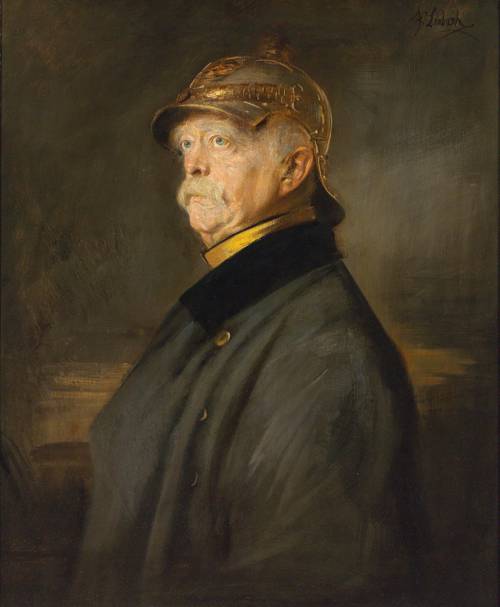
FAQ About Otto von Bismarck

Who was Otto von Bismarck?
Otto von Bismarck was a Prussian statesman who became the first Chancellor of the German Empire, serving from 1871 to 1890. He is best known for his role in unifying Germany and for his influential foreign and domestic policies. Bismarck was a master of realpolitik, a term that describes politics based on practical and material factors rather than ethical or ideological considerations.

What was Otto von Bismarck's role in the unification of Germany?
Otto von Bismarck played a pivotal role in the unification of Germany through a series of wars and diplomatic maneuvers. He led Prussia in the Danish War of 1864, the Austro-Prussian War of 1866, and the Franco-Prussian War of 1870-1871. These conflicts and the strategic alliances he forged helped unite the numerous independent German states into a single nation-state under Prussian leadership.

What is realpolitik, and how did Bismarck use it?
Realpolitik refers to a system of politics or principles based on practical rather than moral or ideological considerations. Otto von Bismarck was a proponent of realpolitik, using pragmatic and strategic decisions to achieve political goals. His diplomacy and military strategy were focused on strengthening Germany nationally and internationally, often prioritizing state interests over ideology or ethics.

What was the Kulturkampf?
The Kulturkampf, or "culture struggle," was a series of policies initiated by Bismarck in the 1870s aimed at reducing the influence of the Catholic Church in Germany. Bismarck perceived the Church as a political threat to the newly unified German state. The policies included increased state control over church activities, education, and civil marriage. Although they faced strong opposition and were eventually relaxed, these measures were part of Bismarck's broader effort to consolidate state power.

Why did Otto von Bismarck implement the social welfare programs in Germany?
Otto von Bismarck introduced social welfare programs as part of his strategy to undermine the appeal of socialism and to gain the loyalty of the working class to the German state. Between 1883 and 1889, he established the world's first welfare state with programs including health insurance, accident insurance, and a pension system, laying the foundation for modern social security systems.

What was the Triple Alliance and how was Bismarck involved?
The Triple Alliance was a military alliance formed in 1882 between Germany, Austria-Hungary, and Italy. Bismarck was instrumental in its creation, seeking to maintain peace and Germany's dominance in Europe by isolating France diplomatically. The alliance was part of Bismarck's larger strategy to create a balance of power that would ensure stability and prevent conflicts on the continent.

How did Otto von Bismarck's policies influence European politics in the 19th century?
Bismarck's policies significantly shaped European politics through his use of diplomacy, military power, and strategic alliances. His efforts in unifying Germany altered the balance of power in Europe, and his alliance system sought to maintain peace and stability. Bismarck's actions laid the groundwork for both the power dynamics and tensions that would characterize European relations leading up to World War I.

What were the main achievements of Otto von Bismarck during his tenure as Chancellor?
Otto von Bismarck's main achievements include the unification of Germany, the establishment of a strong, centralized state, and the creation of pioneering social welfare programs. He also skilfully navigated international diplomacy to isolate France and maintain peace in Europe through a system of alliances, contributing to Germany's position as a dominant power in the region.

Why was Otto von Bismarck dismissed as Chancellor of Germany?
Otto von Bismarck was dismissed by Emperor Wilhelm II in 1890 due to differences in policy and approach. Wilhelm II wanted to assert more personal control over German politics and had conflicting views with Bismarck on foreign policy and national issues. Bismarck's approach to governance was more pragmatic and cautious, whereas Wilhelm II sought a more aggressive stance in international affairs.

What was the significance of the Franco-Prussian War in Bismarck's strategy?
The Franco-Prussian War (1870-1871) was a critical component in Bismarck's strategy for German unification. By defeating France, Prussia was able to rally the southern German states around a common cause, leading to their agreement to join a unified German Empire. The war also resulted in the annexation of Alsace-Lorraine and the establishment of Germany as a major power in Europe.

How did Bismarck manage the relationship with Austria after the Austro-Prussian War?
Following the Austro-Prussian War of 1866, Otto von Bismarck adopted a diplomatic approach towards Austria, choosing not to impose harsh penalties. Instead, he aimed to foster a cooperative relationship, recognizing Austria's influence in Europe. This decision facilitated future alliances and ensured Austria remained a non-hostile neighbor, which was crucial for sustaining peace in the region.

What were Bismarck's domestic policies besides social welfare?
Besides implementing social welfare programs, Bismarck's domestic policies included the Kulturkampf, which sought to reduce the Catholic Church's influence, and efforts to suppress socialism through the Anti-Socialist Laws. He focused on strengthening the unified German state's infrastructure and economy, promoting industrial growth and legal reforms.

Did Bismarck support colonial expansion?
Otto von Bismarck was initially skeptical of colonial expansion, seeing it as potentially costly and risky. However, under pressure from business interests and nationalists, he eventually pursued a limited colonial policy. German colonies were established in Africa and the Pacific, but Bismarck remained primarily focused on European stability and power balance.

How did Bismarck influence Germany's military policies?
Bismarck played a significant role in shaping Germany's military policies through his emphasis on preparedness and strategic use of military force to achieve political objectives. He maintained a strong military to support his diplomatic strategies, using victories in wars like the Franco-Prussian War to further national unity and influence. However, he was cautious about entering conflicts unless they served clear national interests.

What was the Ems Dispatch and its impact on European politics?
The Ems Dispatch was a telegram edited by Bismarck to provoke France into declaring war on Prussia, leading to the Franco-Prussian War. By manipulating the language of the dispatch, Bismarck inflamed public opinion in both France and Prussia, ensuring French aggression appeared as the cause of the conflict. The war that followed was crucial in achieving German unification and altered the European balance of power substantially.

How did Bismarck's foreign policy aim to maintain peace in Europe?
Bismarck's foreign policy, known as the "Bismarckian system," aimed to maintain peace through a complex web of alliances and treaties, such as the Triple Alliance and the Reinsurance Treaty with Russia. He sought to isolate France diplomatically, prevent any two-front conflicts for Germany, and maintain a balance of power, especially in the Balkans and among great powers in Europe.

What was the significance of the Berlin Conference of 1884-85 in Bismarck's foreign policy?
The Berlin Conference of 1884-85, organized by Bismarck, aimed to regulate European colonization and trade in Africa. It is significant for establishing rules for the annexation of African territories and reflecting Bismarck's interest in fostering European cooperation. The conference underscored Bismarck's diplomatic skills and helped prevent conflicts among European powers over colonial issues.

What impact did Bismarck have on the German legal system?
Bismarck's tenure saw the reform and unification of the German legal system. He implemented legal codifications and reforms that standardized laws across the states of the newly unified Germany. These efforts not only contributed to administrative unity but also provided a stable and predictable legal framework necessary for economic growth and modernization.

How did Bismarck's strategies contribute to the future tensions leading to World War I?
While Bismarck successfully maintained peace during his tenure through alliances and diplomatic policies, his dismissal and the subsequent abandonment of his careful strategies contributed to future tensions. The lack of restraint in alliance commitments, military build-up, and aggressive postures by later German leadership, combined with unresolved international rivalries, helped set the stage for World War I.

What was the Anti-Socialist Law, and why did Bismarck introduce it?
The Anti-Socialist Law, introduced by Bismarck in 1878, aimed to curb the growth of socialism, which he saw as a threat to the stability of the German Empire. The law banned socialist organizations, meetings, and publications. Despite its repression, socialist ideas continued to spread, partly motivating Bismarck to introduce progressive social welfare policies to appease the working class.
